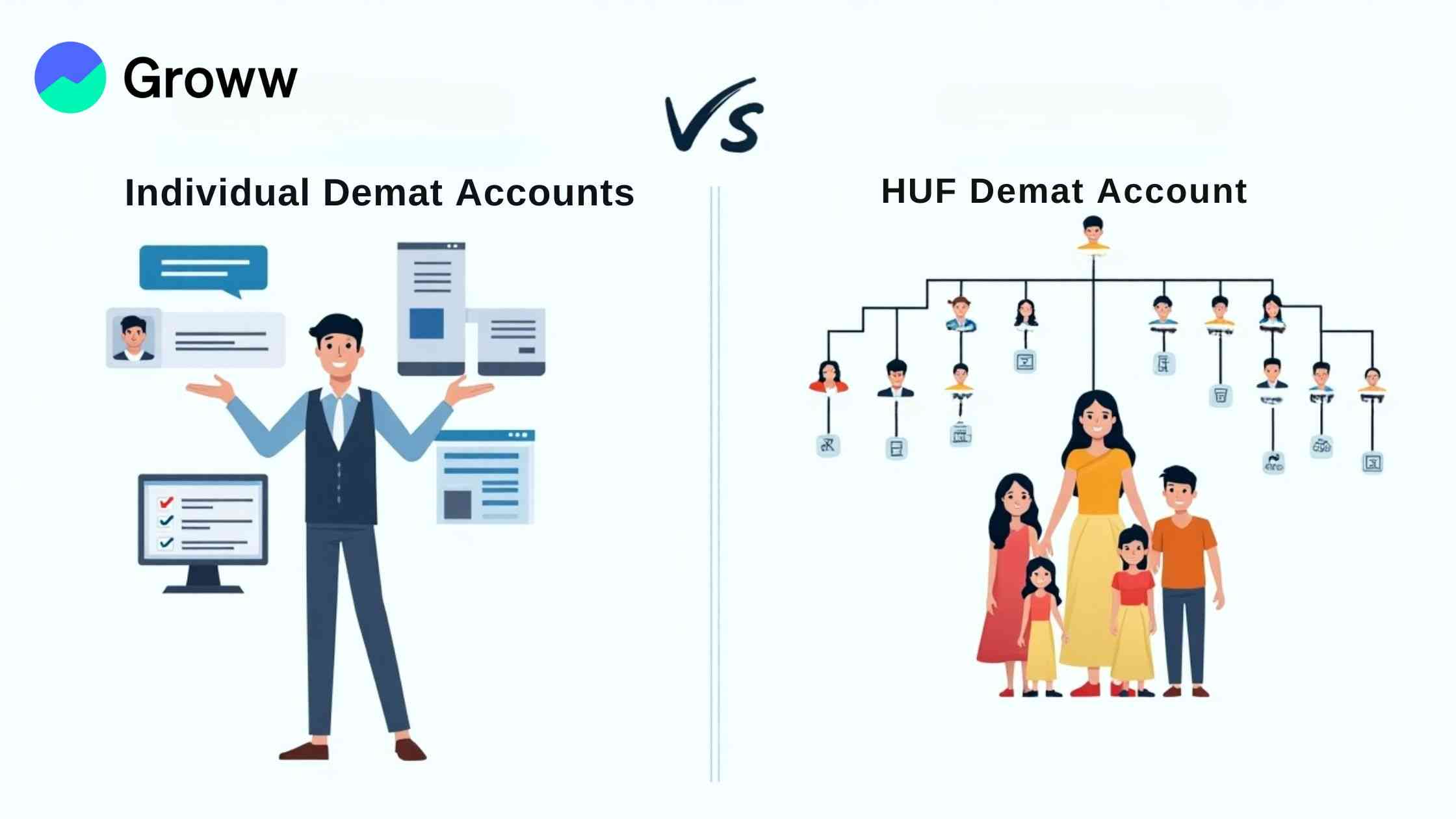Difference Between Individual and HUF Demat Accounts

Choosing the right type of demat account is more than a paperwork formality — it directly impacts how your investments are managed, taxed, and inherited. Whether you’re an individual investor managing your personal wealth, or part of a Hindu Undivided Family (HUF) managing joint family assets, the account structure you pick should align with your financial goals
What is an Individual Demat Account?
An individual demat account is a digital account that holds securities like shares, mutual funds, and bonds in electronic form. It is a must for investing and trading in the stock market, and can be opened by Indian residents above the age of 18. Parents or guardians can also open these accounts in the name of minors, while NRIs may also open the same.
A valid PAN card is compulsory to open an individual demat account, along with adherence to KYC norms (providing identity and address proofs and bank statements).
What is a HUF Demat Account?
A HUF demat account that is one under a HUF and is managed by the Karta on the family’s behalf. HUFs can hold and trade in shares, mutual funds, bonds, etc., while being taken as a separate tax entity with their own PAN and independent tax returns (separate from the tax returns of members). This is a popular choice for family or legacy-based investing, enabling better management of family wealth and also for potential tax benefits in case of multiple generations in the household.
Also Read : Demat Account for HUF - A Beginner's Guide
Key Differences: Individual vs HUF Demat Account
Here are some of the main differences between individual and HUF demat accounts.
|
Feature (not limited to) |
Individual Demat |
HUF Demat |
|---|---|---|
|
Ownership & PAN |
Individual account user with unique PAN |
All HUF members and is managed by the Karta with a separate and independent PAN |
|
KYC |
Individual Identity & Address Proof |
KYC documents of both HUF and Karta |
|
Taxation |
Income is added to the total income of the individual and taxed as per the respective slab |
Taxed at the same slab rate as individual taxpayers but on the HUF PAN. This enables higher tax savings by splitting the income. |
|
Investment Purpose |
Individual wealth accumulation and investments/trading in the stock market |
Family/legacy investments and wealth accumulation, along with asset management |
Read more : How to Open a Demat Account for Partnership Firms & Required Documents?
Tax Implications of Both Accounts
HUFs are taxed at the same slab rates as those applying for individual taxpayers. However, since the HUF is taken as a distinct and separate taxable entity, the basic exemption of ₹2.5 lakh is available on its total taxable income, over and above the individual income tax benefits.
Having 2 PANs help in reducing the overall tax burden as the income is divided between the individual and HUF PAN.
HUF also qualifies for benefits under Sections 80C, 80D, 80G, etc. It is also eligible for exemptions under Sections 54F and 54 with regard to capital gains.
For both individuals and HUFs, STCG (short-term capital gains) of 20% is applicable in case the assets are held for one year or less. LTCG (long-term capital gains) is applicable on profits resulting from assets held for more than one year and is taxed at 12.5% for gains above ₹1.25 lakh for equity and 20% with indexation for other assets.
Earlier, Section 10 (38) exempts capital gains on the sale of listed equity shares that are held for more than 12 months, where STT is paid. However, this is applicable only on LTCG earned until March 31, 2018.
Under Section 194 of the Income Tax Act, a TDS of 10% is applicable in case income earned from dividends exceed ₹5,000. Further, the applicable TDS would increase to 20%, in case the individual does not furnish PAN.
Also Read : Hindu Undivided Family (HUF): A Smart Way to Save Income Tax
Which Should You Consider?
If you’re a retail investor, trader, or salaried/self-employed professional looking to trade or invest in securities, an individual demat account is the best possible option. In case you are managing your family wealth or looking at legacy-based investing or estate planning, you can take the HUF route for your demat accounts. For high-net-worth families, a combination of both can be the right strategy to optimally lower tax liabilities alongside.
Read More : How to Open a Demat Account for Limited Liability Partnership (LLP) & Required Documents?
Conclusion
You have to choose the right demat account based on your tax planning requirements, future objectives, and preferred investment style. For personal gains and streamlined investing/trading, an individual demat account is preferable, while for efficiently managing family wealth and lowering tax liabilities, HUF demat accounts may be the best option.